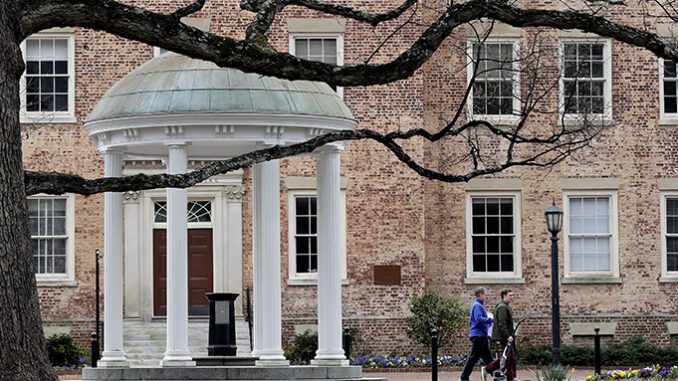
The scariest professor I had in college at UNC was Dr. Daniels.
He taught French 40 ― existential literature. I hated it.
Everyone else loved him. He had a reputation for being lenient in grading ― if a student went to his office to chat with him 3-4 times during the semester, they were pretty much guaranteed to get an A.
Except for the semester I had him. There was an unfortunate cheating scandal during the first exam, so he decided to make every other test extremely difficult ― if a name was mentioned one time in any of the books, it was fair game for the remaining exams.
Since it was dark French fiction from Camus and Sartre, it became a nightmare for someone like me who loved nonfiction and history far more than the depressing existentialism of mid-20th century France.
“Life is so depressing,” Dr. Daniels said one day early in the semester. “You are born. You live. You eat. You marry a woman with hairy armpits. And then you both die and are buried in the ground where worms eat your flesh.”
It was also about this time halfway through my junior year that I was experiencing what I came to realize was an “agonizing reappraisal” of my worldview, faith and life in general. Call it ‘the loss of innocence,” “self-actualization” or plain growing up, take your pick, but it was an intense time of soul-searching and decision-making for me personally.
Did I want to have all of my childhood beliefs and patterns of life challenged in college? Heck no. Did I wish someone had told me not to take French 40 because it was dark, depressing existentialism? I sure did.
But I am glad I took it. It forced me to ask a lot of questions. I talked to a Catholic nun for a long time in the middle of the main quad at 2 a.m. one night who “just happened to be there,” for goodness’ sake.
I wanted to change my major ― for the fifth time ―before my senior year. My faculty adviser said that was sort of nuts since I would have to take seven religion classes out of the last nine I had left to complete at Chapel Hill to major in religion ― but I did it anyway.
I got to read Dietrich Bonhoeffer’s books. I examined as many of the world religions as I could during that short year. No professor or fellow student tried to pressure me to believe one way or the other about anything. There was pure opportunity to freely inquire and ask as many questions as I desired without any fear of ridicule, ostracism or embarrassment.
It wasn’t until I met with the dean of Duke Chapel, James T. Cleland, one brilliant spring day that I could say my agonizing reappraisal was about to end. “Look at the sun and sky outside, Mr. Hill!” Dean Cleland said in his delightful Scottish brogue as he flung open two iron-gated windows in his office. “Do you think all these trees and birds are here by mistake?” he said with a twinkle in his eye.
Later after graduation, I was riding my bike in Chapel Hill for some reason (I lived in Durham) and I just happened ― providentially, again ― to stop at a stop light near the law school on Ridge Road right next to dear old Dr. Daniels.
“Do you really believe all that French existentialism stuff, Dr. Daniels? It is so darned depressing,” I plaintively asked.
“Mr. Hill, I have been teaching Sunday School for the past 40 years!” he said raucously with a hearty laugh as he manually rolled up his window and blithely drove away.
Coach Herman Boone had some good advice about dealing with young people. In the movie “Remember The Titans,” he said to Coach Yost: “I don’t give a damn about how sensitive these kids are, especially the black kids. You ain’t doin’ these kids a favor by patronizing them. You are crippling them; You are crippling them for life.”
Faculty and administrators who seek to shield college students from all viewpoints and facts are coddling them and crippling them for life. They do not know how to debate well or respond when their beliefs are directly challenged in the real world after college.
They need open inquiry on campus to help shape them into the people they were meant to be.



